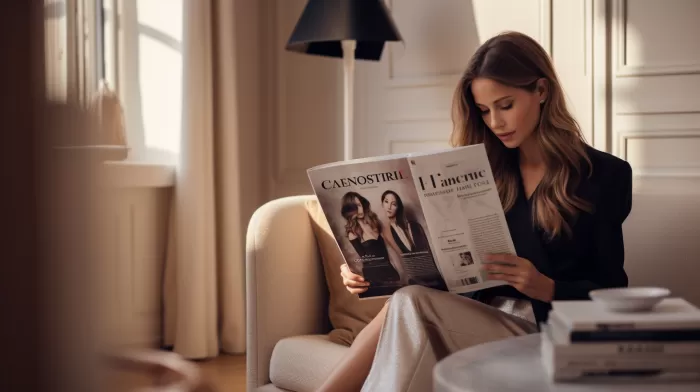Some pictures might be worth a thousand words, but according to research at Ohio State University, browsing certain pictures in magazines might add extra inches to your waistline. The study focused on how readers interact with fashion and beauty magazines featuring pictures of ultra-thin models representing an unachievable goal for most women.
Rather than feeling frustrated at not being as slender as the magazine models, female readers looked at the photos for “thinspiration,” a persistent belief that they could somehow attain a similar figure. However, the emotions women feel from these images are not healthy or helpful, warns researcher Silvia Knobloch-Westerwick.
The False Promise of “Thinspiration”
“Women get the message that they can look just like the models they see in the magazines, which is not helpful,” Knobloch-Westerwick says. “It makes them feel better at first, but in the long run, women are buying into these thinness fantasies that just won’t come true.”
In fact, the researchers found that viewing photos of thin-waisted models could cause magazine readers to gain weight. Women convinced by the highest level of “thinspiration” were the least likely to take action that would help them lose weight.
“They felt better about their body instantly when viewing the images and related content. They weren’t thinking about what they had to do to look like these models,” says Knobloch-Westerwick.
The Subtle Effects of Unrealistic Body Images
Knobloch-Westerwick also warns that while women might see these magazines as pure entertainment, the images can still affect their self-image and health.
“Women might be able to fight off the harmful media impacts on their body satisfaction if they understand how these messages are designed to make them fall for unrealistic and even unhealthy body ideals,” she says.
How to Combat Unrealistic Beauty Standards
While it might seem difficult to avoid the flood of images featuring ultra-thin models, there are still ways to combat these unrealistic beauty standards and protect your self-image and overall health.
1. Seek Out Body-Positive Content
Actively search for magazines, websites, and social media channels that promote healthy body images and diverse body shapes and sizes. Various body-positive influencers can help improve your self-image and reinforce healthier perspectives on body weight and self-worth.
2. Limit Exposure to Beauty and Fashion Magazines
If you are aware that certain magazines influence your self-esteem negatively, reduce your exposure to such publications. Select media that focus on fashion, beauty, and fitness from a more inclusive and diverse point of view.
3. Surround Yourself With Positive Role Models
Surround yourself with friends and family who are supportive and uplifting when it comes to body image, health, and self-esteem.
4. Learn Media Literacy
Educate yourself and others on the techniques used by the media to manipulate images and create unrealistic beauty standards. For example, Learning about photo editing and airbrushing can help you realize the extent to which certain images are manipulated. This knowledge can allow you to view the images with a more critical eye.
5. Focus on Your Unique Qualities
Remember that your self-worth is not defined by your appearance alone. Focusing on your unique qualities, such as your talents, kindness, and intelligence, can help you build confidence and self-esteem from within.
6. Emphasize Healthy Lifestyle Choices
Instead of focusing on achieving an unrealistic body shape, make healthy lifestyle choices through diet, exercise, and self-care. This approach can help you feel good about your body, regardless of the images presented in magazines.
In conclusion, it is crucial to be mindful of the media you consume and its potential impact on your self-image and overall health. By focusing on healthy and inclusive images and prioritizing self-love and wellness, you can better protect yourself from the harmful effects of unrealistic beauty standards.



